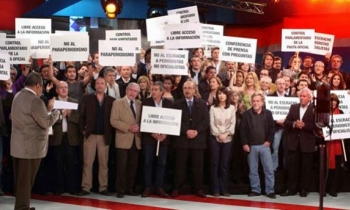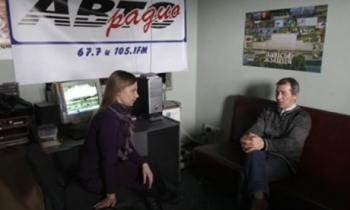The 135-year-old newspaper that enflamed the Muslim world by publishing cartoons of the Prophet Muhammad once offended Nikita Khrushchev so much that the Soviet leader canceled a trip to Denmark.
After deadly riots in the Muslim world, the paper remains defiant with Editor-in-Chief Carsten Juste rejecting suggestions that he resign.
But Juste said his paper would not join an Iranian paper in publishing caricatures of the Holocaust, rejecting statements made earlier in the day by one of his section editors.
Jyllands-Posten, the country's largest-circulation broadsheet, calls itself "Denmark's international newspaper" - a boast with dark resonance now that the paper is being denounced in much of the Muslim world.
Gerhardt Eriksen, a retired employee who has written two books about his former paper, said Jyllands-Posten has a history of being controversial.
In 1959, then-Soviet Premier Khrushchev canceled a visit to Denmark, reportedly because articles in the paper "were very critical of the Soviet Union," Eriksen said. That was in line with a strong anti-communist line held by the paper after the 1917 Bolshevik Revolution, Eriksen said.
In 1992, an editorial bluntly criticizing an anti-immigrant party provoked a furious reaction from conservative voters and readers.
Since its founding in 1871, the paper "always has been leaning to the right of the center in Danish politics, but that doesn't mean they couldn't kick at all sides," Eriksen said.
The paper loosened its ties with the Conservative Party in the 1930s but remained supportive of right-leaning politics. It wasn't until 1971 that it declared itself politically independent.
Based in Jutland, 100 miles northeast of Copenhagen, the paper's circulation is 154,000 on weekdays, rising to about 203,000 on weekends. The controversy over the cartoons has had little effect on those numbers, sales manager Kim Vetsergaard said.
"We have lost a few and we have gained a few," he said.
A former foreign minister, Uffe Ellemann-Jensen, said on national radio Wednesday that Juste should resign. But Juste, in a statement on the paper's Web site, rejected the call.
The Muhammad drawings appeared in a part of the paper that has often been its most controversial - the cultural section.
Among previous disputes involving that section was a 1957 article in which culture editor Jens Kruuse praised a Norwegian book widely regarded as pornographic. That section "has always had a libertarian cultural line," Eriksen said.
On Wednesday, the section's current editor, Flemming Rose, told The Associated Press his paper would run satirical cartoons about the Holocaust as a response to the Muhammad caricatures.
But Juste later dismissed Rose's comment, saying "in no circumstances will publish Holocaust cartoons."
The idea for the Prophet Muhammad drawings stemmed from a complaint by author Kaare Bluitgen, who said he could not find an illustrator for his planned children's book about the prophet.
Jyllands-Posten's culture page put the matter to several cartoonists, questioning whether sensitivities over Islam were prompting self-censorship. The Sept. 30 portfolio of a dozen drawings was the result.
But questions have arisen over whether Jyllands-Posten is practicing its own self-censorship.
A disgruntled artist whose cartoons about Jesus were rejected by the paper in 2003 has been circulating an e-mail from the Sunday edition editor who turned down the drawings, saying they "will provoke an outcry."
"I turned them down because they were not good, their quality was not good," the editor, Jens Kaiser, told The Associated Press on Wednesday. "I have been Sunday editor for 18 years, and I can say that 90-95 percent of the unsolicited material we get is turned down."
The paper has apologized for any offense the cartoons caused to devout Muslims, but has defended its decision to print them as within the bounds of free expression.
The position strikes some as principled, others as obstinate. But it is one the paper appears sure to uphold even as the protests spread.
This week, representatives of Danish Muslims suggested working with Jyllands-Posten to develop a joint statement aimed at calming the tensions.
Juste said such a statement would be possible only "if (Muslims) recognize the existence in Denmark of the freedom of speech."









